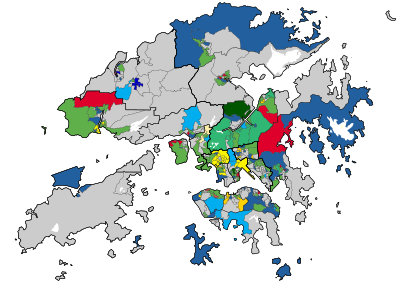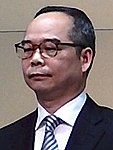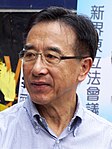
The Democratic Alliance for the Betterment and Progress of Hong Kong (DAB) is a pro-Beijing conservative political party in Hong Kong. Chaired by Starry Lee and holding 13 Legislative Council seats, it is currently the largest party in the legislature and in terms of membership, far ahead of other parties. It has been a key supporting force to the SAR administration and the central government's policies on Hong Kong.
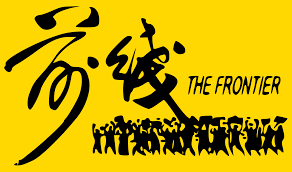
The Frontier was a pro-democracy political group in Hong Kong. It was founded on 26 August 1996 by a group of Legislative Council members and democratic activists headed by Convenor Emily Lau. It was merged into the Democratic Party, the pro-democracy flagship party on 23 November 2008. A new party bearing the same name was established in 2010 by former members who opposed the previous Frontier joining the Democratic Party.

Civil Force is a district-based pro-Beijing political party in Hong Kong. Since 2014, the Civil Force has entered an alliance with the New People's Party of Regina Ip. Headed by chairman Pun Kwok-shan, it had its stronghold in the Sha Tin and Sai Kung Districts and had once the majority of seats in the Sha Tin District Council until its total defeat in 2019.

Civic Act-up is a small pro-democracy political group in Hong Kong. It was founded on 24 September 2003 by a group of relatively young activists with the encouragement of Legislative Councillor Cyd Ho, to challenge the existing pro-government district councillors in Wanchai District in the 2003 District Council elections. There is no formal structure in the group.

Cyd Ho Sau-lan is a former member of the Legislative Council of Hong Kong (Legco) for the Hong Kong Island constituency.

The Hong Kong Island geographical constituency was one of the five geographical constituencies in the elections for the Legislative Council of Hong Kong from 1998 to 2021. It was established in 1998 for the first SAR Legislative Council election and was abolished under the 2021 overhaul of the Hong Kong electoral system. In the 2016 Legislative Council election, it elected six members of the Legislative Council using the Hare quota of party-list proportional representation. The constituency covered all the four districts on the Hong Kong Island, namely, Central and Western, Eastern, Southern and Wan Chai. In 2020, it had 707,277 registered voters.
A list of awards given to members of the Hong Kong Civil Service:
Choy So-yuk, BBS, JP is a Hong Kong politician. She was an elected member of Eastern District Council and a Hong Kong Deputy of the National People’s Congress. From 1997 to 2008 she was a member of the Legislative Council of Hong Kong and its forerunner. Choy is a member of the Democratic Alliance for the Betterment and Progress of Hong Kong (DAB) and her main supporters are pro-Beijing politicians and organisations, especially the Fujianese in North Point on Hong Kong Island.

Ip Kwok-him, GBM, GBS, JP is an unofficial member of the Executive Council of Hong Kong, having been in the position since March 2016. He is also former member of the Legislative Council of Hong Kong for the District Council (First) functional constituency and Hong Kong delegate to the National People's Congress and the former convenor of the caucus of the Democratic Alliance for the Betterment and Progress of Hong Kong (DAB) in the Legislative Council. He was awarded the Grand Bauhinia Medal (GBM) by the Hong Kong SAR Government in 2017.

The 2007 Hong Kong District Council elections were held on 18 November 2007. Elections were held to all 18 districts of Hong Kong, returned 405 members from directly elected constituencies out of total 534 councils member. A total number of 886 candidates contesting in 364 seats, while 41 seats were uncontested. A total number of 1.4 million voters cast their ballots, consisting 38% of the electorate, significantly lower than the last elections in 2003.
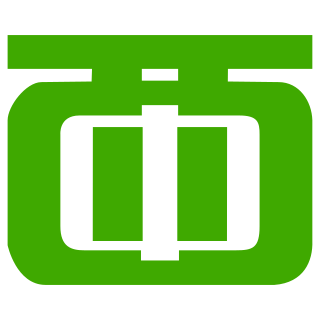
The Central and Western District Council is the district council for the Central and Western District in Hong Kong. It is one of 18 such councils. The Central and Western District Council currently consists of 15 members, of which the district is divided into 15 constituencies, electing a total of 15 members. The last election was held on 24 November 2019.

The Sha Tin District Council is the district council for the Sha Tin District in Hong Kong. It is one of 18 such councils. The Sha Tin District Council currently consists of 42 members, of which the district is divided into 41 constituencies, electing a total of 41 with 1 ex officio member who is the Sha Tin rural committee chairman. The latest election was held on 24 November 2019.

The Fifth Legislative Council of Hong Kong was the fifth meeting of the legislative branch of the Hong Kong Special Administrative Region Government. The membership of the LegCo is based on the 2012 election. The term of the session is from 1 October 2012 to 30 September 2016, during the term in office of the Chief Executive Leung Chun-ying. Due to the new arrangements agreed in a contentious LegCo vote in 2010, the session consists of the new total of 70 seats in LegCo, ten more than previously, with 35 members elected in geographical constituencies through direct elections, and 35 members in functional constituencies, in which five District Council (Second) functional constituency seats each represent all 18 District councils of Hong Kong voted for by all resident voters in Hong Kong. The Democratic Alliance for the Betterment and Progress of Hong Kong remained the largest party while the pan-democrats secured the one-third crucial minority. Notable new members of the LegCo members include Gary Fan from the new established party Neo Democrats and first openly gay councillor, People Power's Ray Chan Chi-chuen.

The Fourth Legislative Council of Hong Kong was the fourth meeting of the legislative branch of the Hong Kong Special Administrative Region Government. The membership of the LegCo is based on the 2008 election. The term of the session is from 1 October 2008 to 30 September 2012, during the second half of the Donald Tsang's administration and first two months of the Leung Chun-ying's term in office. The meeting place was moved from the Legislative Council Building to the new built Legislative Council Complex in 2011. The Democratic Alliance for the Betterment and Progress of Hong Kong remained the largest party with 10 seats. Notable newcomers to the Legislative Council included Regina Ip, Priscilla Leung, Wong Yuk-man, Tanya Chan, and Paul Tse.

The Third Legislative Council of Hong Kong was the meeting of the legislative branch of the Hong Kong Special Administrative Region Government. The membership of the LegCo is based on the 2004 election. The term of the session was from 1 October 2004 to 30 September 2008, during the second half of the Tung Chee-hwa's administration until his resignation in 2005 and was replaced by Donald Tsang for the rest of the term, and also the beginning of the third term of Chief Executive after Tsang won in the 2007 Election. The Democratic Alliance for the Betterment of Hong Kong (DAB) became the largest party with 10 seats. Notable newcomers to the Legislative Council included Leung Kwok-hung, Alan Leong, Ronny Tong, Albert Cheng, and Jeffrey Lam.

The election for the Hong Kong deputies to the 12th National People's Congress (NPC) was held on 19 December 2012. 36 Hong Kong deputies were elected by an electoral college composed of 1,621 members.

The election for the Hong Kong deputies to the 10th National People's Congress (NPC) was held on 3 December 2002. 36 Hong Kong deputies were elected by an electoral college.
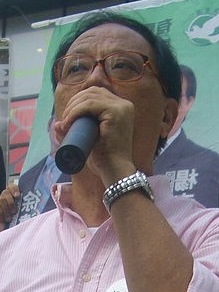
These are the Hong Kong Island results of the 2004 Hong Kong legislative election. The election was held on 12 September 2004 and all 6 seats in Hong Kong Island were contested. The pro-democracy camp failed to win four out of six seats with the two tickets of the Democratic Party and Article 45 Concern Group's Audrey Eu and The Frontier's Cyd Ho joint ticket. The last-minute emergency call of Martin Lee cost the defeat of Cyd Ho in a narrow margin to Democratic Alliance for the Betterment of Hong Kong's (DAB) Choy So-yuk. Legislative Council President Rita Fan also contested in Hong Kong Island for the first time.
